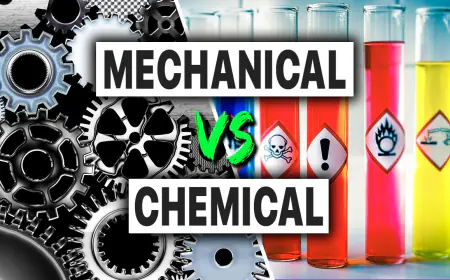Chemical vs Mechanical vs Civil vs Computer Engineering: Which to Choose?
In India, three popular choices are Chemical Engineering, Mechanical Engineering, Civil Engineering and Computer Engineering. Here we talk about what to take.

Are you considering a career in engineering but unsure which path to take? With numerous types of engineering fields to choose from, it can be overwhelming to decide which one is right for you. In this article, we'll delve into four popular engineering fields: chemical, mechanical, civil, and computer engineering. We'll explore the key differences, job duties, salary expectations, and educational requirements to help you make an informed decision.
Chemical Engineering
Chemical engineers design and operate plants and equipment to manufacture chemicals, fuels, and other products. They apply principles of chemistry, physics, and mathematics to develop new materials, processes, and products. Chemical engineers work in various industries, including energy, pharmaceuticals, and food processing.
- Educational requirements: Bachelor's degree in chemical engineering or a related field
- Job growth: 4% (slower than average)
Mechanical Engineering
Mechanical engineers design, develop, and test mechanical systems, including engines, machines, and devices. They work in various industries, such as aerospace, automotive, and energy. Mechanical engineers apply principles of mechanics, thermodynamics, and materials science to create innovative solutions.
- Educational requirements: Bachelor's degree in mechanical engineering or a related field
- Job growth: 4% (slower than average)
Civil Engineering
Civil engineers design, build, and maintain infrastructure projects, such as roads, bridges, buildings, and water treatment plants. They work in both public and private sectors, ensuring that structures are safe, efficient, and environmentally sustainable.
- Educational requirements: Bachelor's degree in civil engineering or a related field
- Job growth: 7% (faster than average)
Computer Engineering
Computer engineers design, develop, and test computer hardware and software. They work on a wide range of projects, from microprocessors and embedded systems to computer networks and artificial intelligence. Computer engineers apply principles of electrical engineering, computer science, and mathematics to create innovative solutions.
- Educational requirements: Bachelor's degree in computer engineering or a related field
- Job growth: 3% (average)

Which Engineering Field is Right for You?
When choosing an engineering field, consider your interests, skills, and career goals. Ask yourself:
- Do you enjoy working with chemicals and developing new products? Chemical engineering might be the way to go.
- Are you fascinated by machines and mechanical systems? Mechanical engineering could be your calling.
- Do you want to design and build infrastructure projects that benefit society? Civil engineering is a great choice.
- Are you passionate about computer hardware and software? Computer engineering might be the perfect fit.
Ultimately, the choice between chemical, mechanical, civil, and computer engineering depends on your individual strengths, interests, and goals. Research each field thoroughly, and consider speaking with professionals in each field to gain a deeper understanding of what each career path entails.
Read Also: ITI vs B.Tech in India: What I choose in 2024? Is it worth it










































